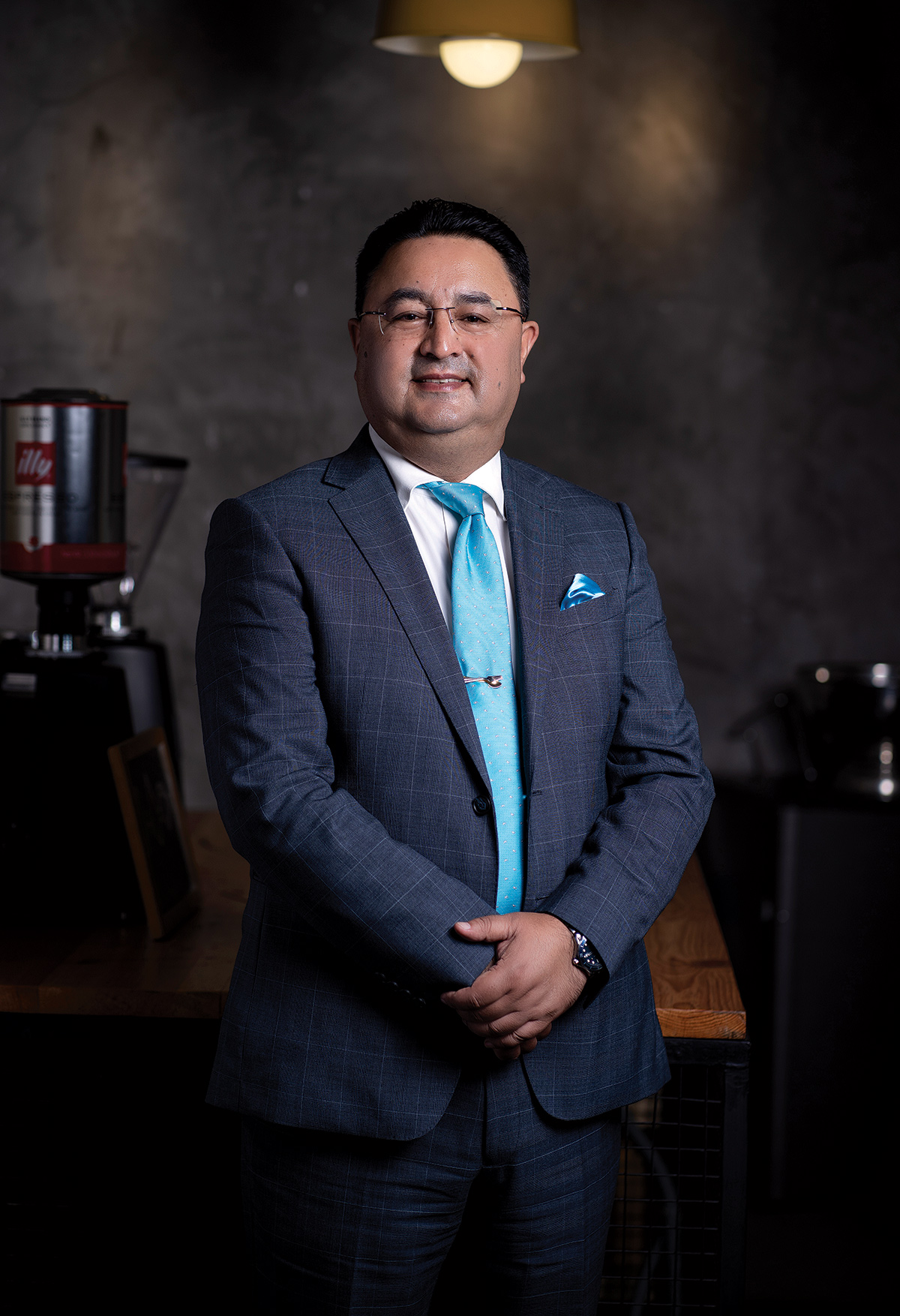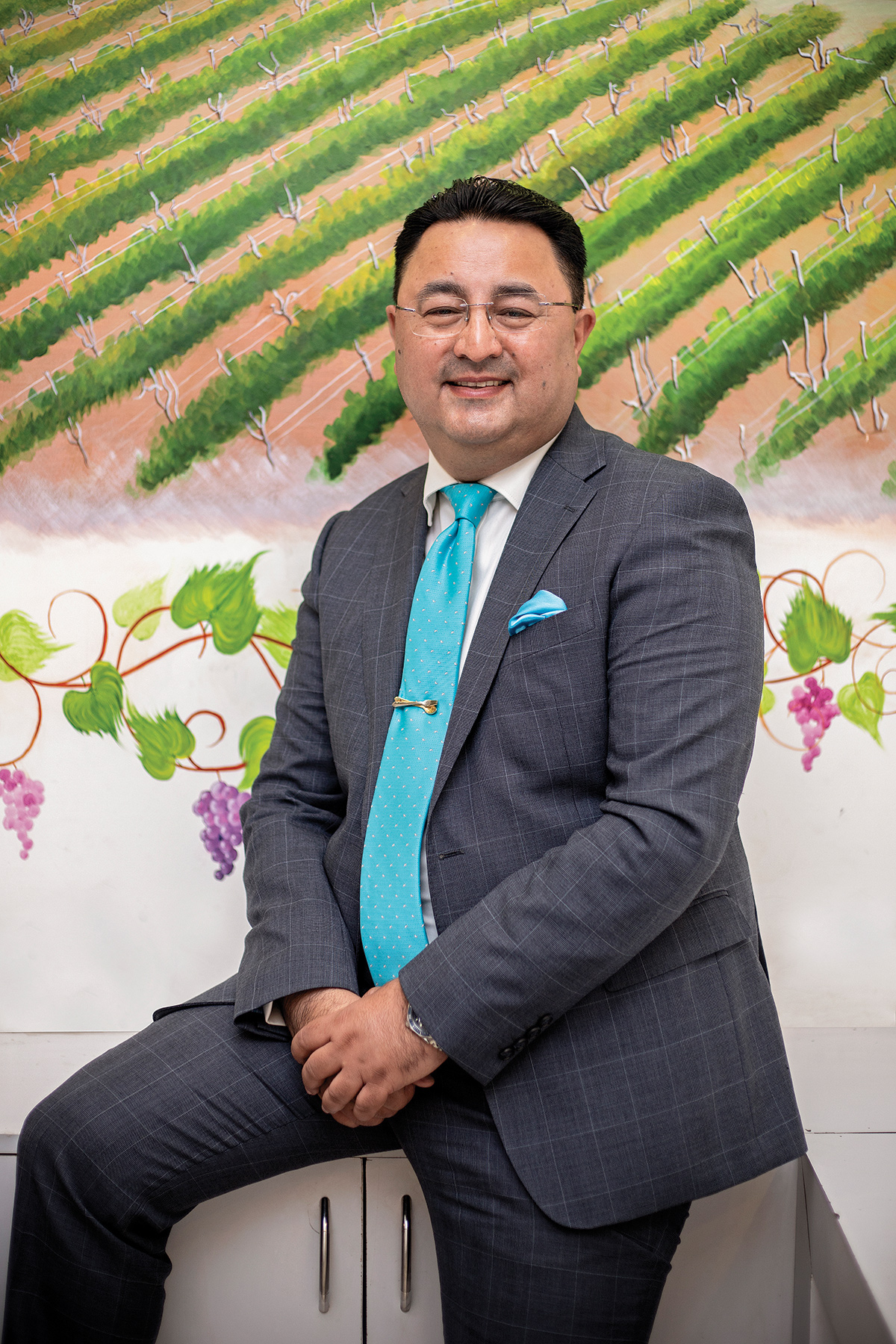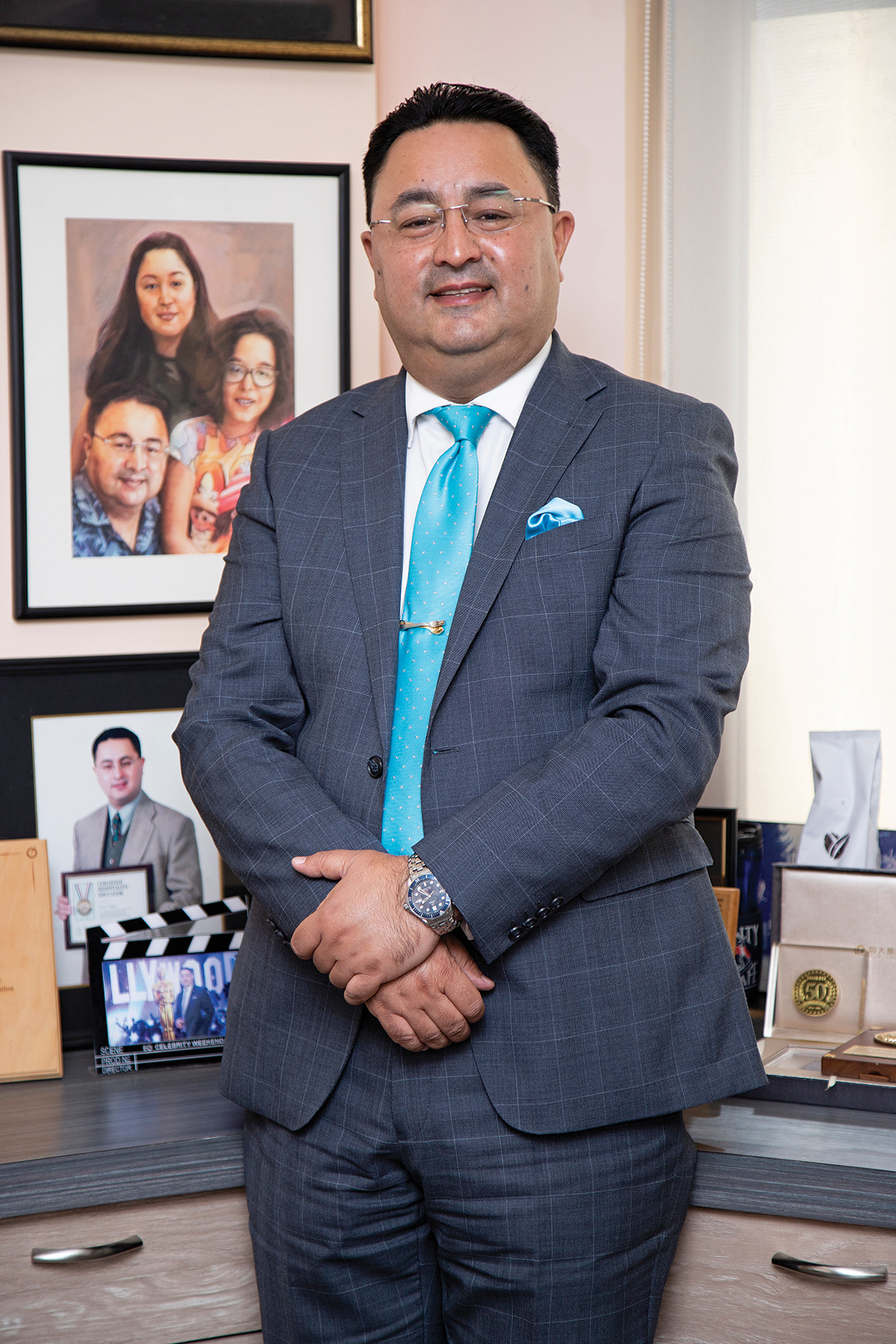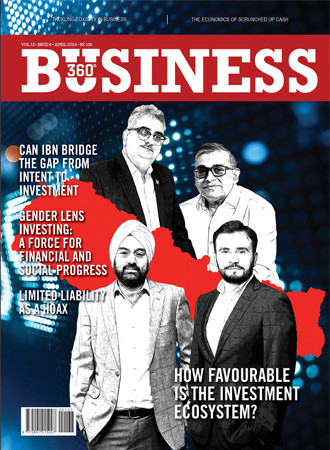
Text by Ujeena Rana
Samir Thapa has his name associated with many firsts: the first to introduce an international fastfood joint – Wimpy - in Nepal; the first entrepreneur in his family; the first to run a private hotel management school in Nepal; the first to do a Masters in Hospitality Management in Nepal; the first Certified Hospitality Educator in Nepal.
A Room with a Character
Office cabins say a lot about their occupants. Some cabins offer “just moved in” feel even when it has seen many seasons, some are messy with office supplies, phone, files wrestling for space on the table, while there are others which boast a character. Samir Thapa’s cabin falls in the last category.
Ozzy Osbourne’s autobiography ‘I am Ozzy’ stares at you from the coffee table typifying Thapa’s love for music; the only organism in the aquarium is a 17-year-old turtle which claims the entire tank as its territory; Chirag Bangdel’s ‘Geet Gatha’ paintings exude colour and vibrancy to the room; the multitude of photographs offer testimony to a good life lived; the souvenirs and collectibles are conversation starters, and books attest that their keeper harbours an inquisitive mind.
Accidental Entrepreneur
Samir Thapa’s autobiography, if he ever decides to write one, should carry the title - The Accidental Entrepreneur. Thapa had plans to become a doctor and ended up becoming a risk-taker, challenge acceptor and opportunity identifier in the hospitality sector.
While in high school in Bangalore, he was at a concert when Thapa came across a guy with a thick medical book in his hand. Amidst hard rock metal echoing through the St. John’s Medical College ground and attendees’ head-banging, the gentleman had a different agenda. “Who on earth attends a concert with Plan B of burying his nose into the pages of a book if he does not like the numbers being played?” Thapa quizzes. But this particular medical student’s mindset troubled Thapa’s impressionable mind and he tossed the idea of becoming a doctor into the winds.
On returning from Bangalore, his attention was drawn to a different profession. At hotels and restaurants, he found himself pulled by the striking demeanor of hoteliers. He was intrigued. “Only after I had entered the hospitality industry did I learn that all is not glitz and glamour,” he laughs.
His father, Sashi Bahadur Thapa - an engineer and bureaucrat - thought that the hospitality sector would suit his son’s personality best. “Also, tourism can never be an outdated business in a country like ours,” he shares. His father suggested that he attend hospitality school in Switzerland. After studying in one of the best schools in the world in Switzerland previously called Alpina Institute and now part of Hotel Institute Montreux, he went to the United States to further his studies. Meanwhile, he had also gained a handful of work experiences.
On return, he landed a job at Radisson Hotel Kathmandu as the Food and Beverage head. “We were one of the first employees when the hotel was established in Nepal,’ informs Thapa. But like in most industries back in those days, hotels were populated with foreigners in the white collar jobs.
This upset him. But the last nail in the coffin came in the form of a sad realisation when during the hiring process for Radisson in 1997, out of 3000 plus applicants for 300 plus vacancies, only 10 were hospitality graduates. This dearth of educated hospitality professionals distressed him and little did he know that the idea of opening a hospitality school had already taken seed in his mind.
Nepal Academy of Tourism and Hotel Management (NATHM), which was then called HMTC, was only a vocational skills provider at that time. It started its Bachelor’s degree in 1999; while Silver Mountain was established in 2001.

The Namesake
Ask any writer and they will tell you that interviews start to get interesting when the interviewee spills stories, anecdotes, facts not shared elsewhere. That is their loot for the day!
Samir Thapa has been interviewed multiple times across multiple mediums therefore not much has remained unsaid in the media. However, the story behind naming his management school is a fresh one for many.
It goes without saying that Thapa is a music lover. The walls in Silver Mountain are adorned with the pictures of The Doors, Led Zeplin and Ozzy Osbourne attesting to the fact that beneath the astute businessman rests the soul of a heavy metal and rock music fan. Thapa does not have a new-age artist in his favourite list. He still listens to good old music.
In 1992 when he was studying in Switzerland, he attended a Rainbow concert. Little did he know that the spotlight would fall on him that day. The band’s frontman, Ronnie James Dio, asked if anyone in the crowd was from Nepal. “I was drunk and did not hear a thing. But my friends asked me to raise my hand. I did but had no clue why I was even raising my hand. Anyway, he tells the crowd that the next song which they were about to play was written when the band was trekking in the Everest region and therefore, he dedicated the song to me - a Nepali who comes from the land where the song was born. The song was “Man on the Silver Mountain”.” Years later when Thapa was racking his brain to come up with a suitable name for his management school, he recalled this life event and thus a namesake was born.
The Beginning
In 1997, Thapa was doing his homework for the hospitality college, when he had a chance to open a Nepali franchise of Wimpy, a British fast food chain. He considers Wimpy as a milestone in his career as “The networking that I built during that time serves me till date. When I came back to Nepal, I did not know the who’s who of Kathmandu. My PR was close to non-existent. Wimpy became the hottest joint in Kathmandu. From commoners to the Crown Prince, everybody used to frequent the place. Everyone desired to see and be seen at Wimpy. The opening gathered a crowd which stood in a half kilometer queue,” he reminisces.
Later logistic hassles proved difficult for the young team and the outlet was sold to a meat processing company. Thapa and his team had purchased the license for five years out of which they ran the franchise for a year.
While he was researching for the hospitality college, his professor in the United States connected him with the curriculum from American Hotel and Lodge Association, “which is the largest hospitality association in the world,” he informs and adds, “they used to provide curriculum to all top-notch schools in the world. So, I took up the curriculum and set up the school here.”
According to Thapa, they had tried to get a curriculum from a local university but “unfortunately our local universities did not offer a curriculum in the hospitality stream except for TU which also gave the affiliation to NATHM and that too only in 1999. So, we looked for a curriculum which was recognised internationally. Also, we opted for an international program. Later, in 2011, we changed the university and went with a British university. Now, Silver Mountain offers a British Bachelor’s degree. Presently, we are affiliated with Queen Margaret University.”
The reason for the switch from American to British University has to do with economics, he explains. “Our market is cost sensitive. We cannot afford huge amounts for international degrees in this country. Moreover, our paying capacity is unimpressive. American Universities have raised fees and charge a hefty amount which our students cannot afford to pay. So, we were bound to change the university,” he informs and adds, “However, the present British university that we are associated with is the oldest university that offers a degree program in Nepal.” The institution, now named, Queen Margaret University is more than 140 years old and was established as the Edinburgh School of Cookery in 1875. This was the first culinary school established in the UK opened for women. “This university is a member of Privy Council of Queen Elizabeth. There are 21 Universities in the UK which are members of the Privy Council and Queen Margaret University is one of them,” he informs.
In 2001, when Silver Mountain was opened, the country was immersed in political turmoil: the civil war and the Royal Massacre. Thapa narrates, “We stopped admission that year. And in 2002, we started operations with eight students. Now 19 years later, we are one of the largest hospitality schools in the country. We have more than 70 hotel management schools offering bachelor’s degree in Nepal out of which six are opened by my faculty members and three by my students.”
Silver Mountain is a family-based institution. His wife Rachana Thapa, sister Sandipa Basnet; and cousin Ava Shah are the core team members. All are hotel graduates and have work experience from different hotels in the country.
Why Silver Mountain
One of the reasons people choose Silver Mountain is the placement offer: two internships during the four year course. The college sends its students to 84 hotels, all 5 stars spread across 17 countries. Recruitment happens right after the graduation where more than 11 properties from nine countries visit every year and perform in-house recruitment. “This year, our placement percentage reached 92. We don’t entertain agents, no middlemen,” Thapa underlines.
Also, Silver Mountain works closely with the local hotels, “We are part of Hotel Association Nepal (HAN). All the major hotels in the country have our students, some of whom have reached to the position of Directors. We are also the academic partner of Intercontinental Hotels Group (IHG) in the country. IHG has only 150 academic partners in the world and Silver Mountain is one of them. Our students can apply and get offer of employment from all IHG properties,” he shares.
Besides, they have short term programs which emphasise on basic skills required in smaller properties like restaurants, bars and one and two star hotels. These could be for six months, a year and could even be a departmental specialisation.
“We have around 1200 graduates from all the hotel management schools every year. But even then, most of them move abroad. One thing is that they are not getting the opportunities here because of the abysmal turnover. Probably, one hotel takes a maximum of 10 fresh graduates. Secondly, our industry has become heavily politicised that even graduates have to know someone in the union to land a job. Also, the money is less. Our graduates hardly make Rs. 30,000 as the starting salary. If they go abroad, the minimum salary offered is Rs. 80,000,” he informs.
Spreading its Wings
“After the country has gone into federal structire, we have also begun to decentralise. To fulfill that objective, we have opted for two models: we have gone to Pokhara and Nepalgunj in partnership model since the last two years, and we have started our franchise schools in Dang and Nepalgunj. The plan is to spread our brand to all the provinces because we have noticed that 70% of our students are from outside the valley. If our brand is in their towns, they need not travel to Kathmandu and the living cost, which the out-of-the-valley students have to bear otherwise, will be substantially reduced,” he shares For a four year course, Silver Mountain charges Rs. eight lakhs.
Samir Thapa says, “Silver Mountain has developed two features inside the campus which you don’t find in other schools: one is the coffee cafe and the other is the wine lab. Università del Caffè, illy cafe’s University of Coffee, is the only coffee university in the world. They have branches in 32 locations in the world, we are the 28th branch opened. We opened that in 2017. We are the first one in the SAARC countries to have it. We are also expanding our coffee training to various parts of Nepal.” The other feather in their cap is the addition of the only wine lab in the country which they built in 2013. Thapa argues that no one has got one yet. They bring wine from all over the world for the students to taste. The wine lab can also be utilised by the industry for their staff to be trained in varieties of wine and for them to partake in the wine tasting experience. The same is for the vendors. Even homemakers visit their wine lab to be educated on wine. Additionally, there are individuals who want to learn about wine and coffee as these have become part of our modern lifestyle.
Moreover, bakery, which is garnering all the hype in recent times, is another art that Silver Mountain is focusing on. The kitchens at Silver Mountain are an envy for many studying hospitality elsewhere.


Productive Failures
Thapa has experienced a fair share of failures during his entrepreneurial journey. He had opened Dhaba restaurant which did not do well. He was also part of a chain of hotels called Heritage Group of Hotels. “The idea was ahead of its time. It is tragic that we could not run it for long.” Also, he was involved with a flight magazine called “On Time Magazine” which listed flight schedules of domestic and international airlines.
The beauty of making mistakes is the lessons learnt from them. “From my failures, I learnt to not jump into ideas just because they look attractive; sustainability factor needs to be weighed, and an idea needs to be introduced at the right time,” he shares.
Entrepreneurship
Sixty percent of our population is comprised of youths. By early 30s, one decides their future path. Jobs are hard to find. Migration becomes a necessity. Entrepreneurship may hold the key.
“I always promote the notion of ‘Entrepreneurship with innovation’. We need to check for duplication of ideas,” he tells. However, he opines that instead of labour drain, the country should worry about intellectual drain.
According to Thapa, unlike labour drain, intellectual drain has no certainty of return. These educated and skilled manpower is saleable everywhere abroad. “That’s why we need to have lots of innovation. Whatever accelerator programs happening are not enough. And startups are happening only in the cities. There are loads of ideas but all these do not see the light of the day. Government should introduce multiple programs to provide access to finance to these youths so that they can create industries,” he states.
Thapa was one of the founders of the Nepalese Young Entrepreneurs’ Forum (NYEF), which was established as the youth wing of FNCCI. NYEF is now a separate entity.
“Entrepreneurs are so fast; ahead of their time. But ineffective political system and policies act as speed breakers. That is the biggest challenge for entrepreneurs. If the policies facilitate initiatives by entrepreneurs, if there is support from the government, these ideas will take the form of industries in a short span of time,” believes Thapa.
The Years to Follow
Thapa is just 45 years old. It is premature to ask anything even remotely related to retirement to someone who is in his mid-40s, heading a recognised education institute, contributing to the industry and the society from multiple fronts, and making expansion plans and chasing dreams. However, it is not that Thapa had not toyed with the idea till the question was posed to him. Apparently, he has been contemplating on the matter. “I want to retire in my 50s.” It did not take him long to answer. “I want to dedicate my time for the conservation of wildlife. Earlier, my family indulged in hunting. Moreover, I want to have an office in a kindergarten school. I don’t want to get involved in the daily functioning of the school, but just have my office there so that I can go there sometimes and listen to the toddlers, converse with them, and be amidst purity and innocence.”
One needs to retire at the right time since businesses cannot thrive if the same leader and the team head it for decades. Newer ideas need to be introduced and new leadership needs to take charge otherwise the team’s pace will slow down. “In 5 to 10 years, the core members should be in the advisory board rather than get involved in the everyday operations of Silver Mountain,” he opines.



-1714969605.jpg)
-1712728897.jpg)
-1709873108.jpg)